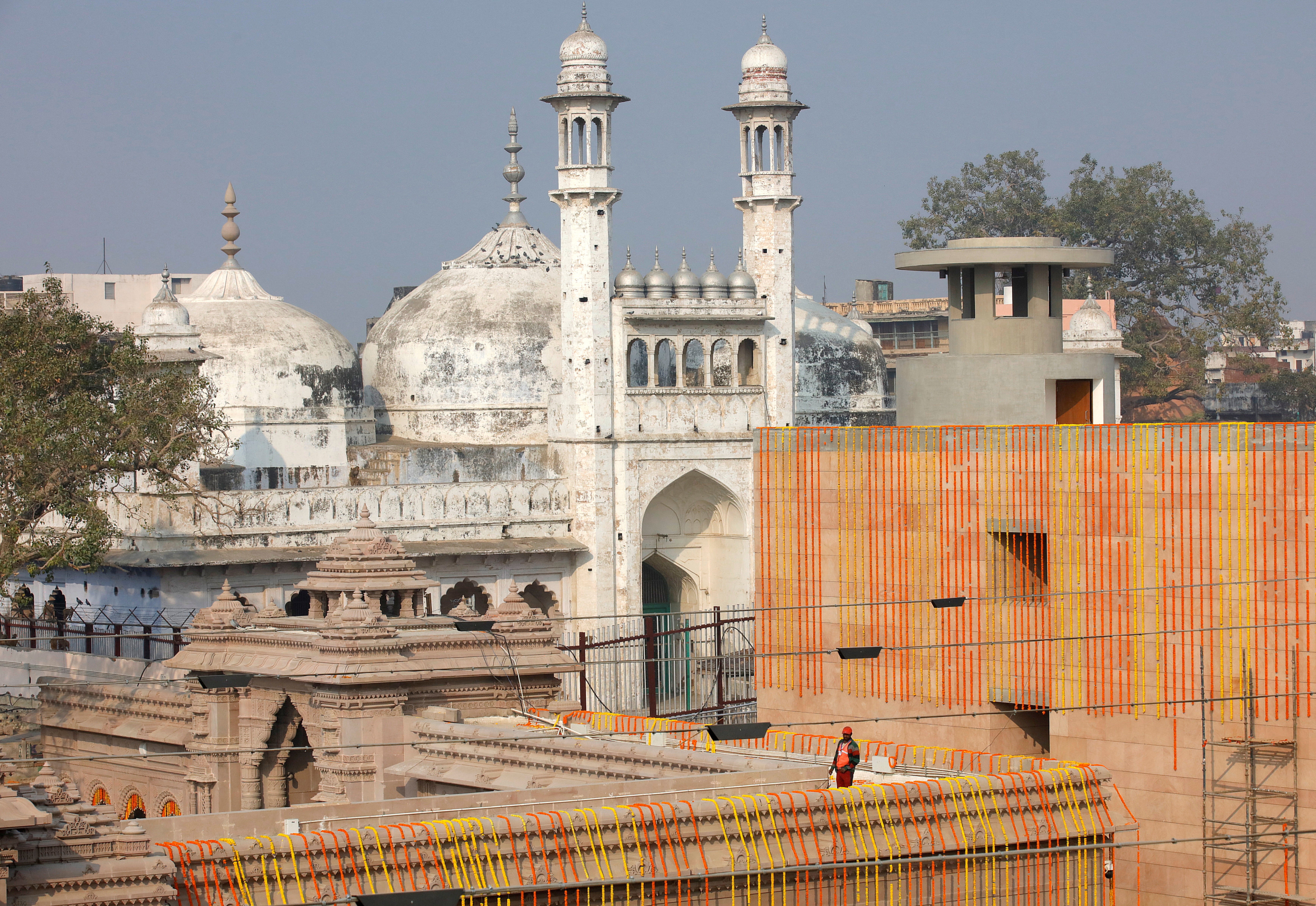Fountain or shrine? Court seals part of Gyanvapi mosque complex as dispute leaves India divided
Hindus claim to have found a holy relic at the mosque while Muslims say it’s a fountain

A part of a centuries-old mosque in India has been ordered to be sealed by a local court that has also banned large gatherings for prayers after a survey team claimed it found relics of the Hindu god Shiva and other religious symbols inside its premises.
A portion of the Gyanvapi mosque in the city of Varanasi — regarded as a holy city by Hindus and also the constituency from where the country’s Hindu nationalist prime minister was elected — was ordered to be sealed by a local court.
The court said “no person” was to be allowed “to enter the place which will be sealed”.
But India’s top court, hearing the matter on Tuesday, told the Varanasi district magistrate to ensure that the area where the “shivling” – a holy relic of the Hindu deity Shiva – was found is protected without impeding prayers by Muslims.
A water tank at the mosque, where Muslims perform the wuzu or ritual of ablution before offering prayers, was ordered to be sealed off.
The Supreme Court heard a petition by the mosque’s management committee challenging another order by the local court directing a videography survey at the complex.
The controversy, which dates back to 1991, gained momentum last year after five Hindu women sought permission from the court for daily prayers in a part of the mosque.
They claimed a Hindu temple once stood at the site, marking the start of a dispute reminiscent of another one that was controversially resolved in 2019.
The mosque is one of the several such in India that stand adjacent to temples – in this case, the iconic Kashi Vishwanath temple.

The mosque has become the latest Hindu-Muslim flashpoint in which Hindu hardliners claim some mosques have been built over demolished Hindu temples in the country.
The local court formed a commission to conduct a survey of the mosque to verify the claims and submit a report of its findings. The video survey, spanning over three days, was conducted under heavy police security and concluded on Monday.
Hari Shankar Jain, the petitioner for the five women, filed an application that claimed one of the women found a shivling at the mosque and demanded the complex be sealed.
The local court, citing “evidence”, ordered for the restriction of gatherings at the mosque and stated the Central Reserve Police Force “should be directed to seal it” on 16 May.
“This is very important evidence... Varanasi District Magistrate should be directed to stop the entry of Muslims. Only 20 Muslims should be allowed to pray at the mosque and they should not be allowed to perform wuzu,” the local court stated in its order.

The mosque committee, however, disputed the findings and said the object being called a shivling is a fountain customary in all mosques.
SM Yasin, general secretary of the Anjuman Intezamia Masjid Committee, said they will challenge the order.
“The structure is part of the fountain in the wuzu area. In all old mosques, there used to be a hauz (basin), and a fountain in the centre. This is part of the fountain, which they are calling shivling. We are surprised how the court passed the order in a hurry. We will mention it in the Supreme Court,” he had said.
During the videography survey, the water tank was emptied and the team of surveyors collected evidence as Hindu devotees chanted Hindu slogans, showed videos outside the mosque on social media.

On Tuesday, a Varanasi court suspended Ajay Kumar Mishra, a top official who led the filming and survey, after its findings, which should have been confidential, were leaked.
The court said the breach of confidentiality was “highly improper” while granting a two-day extension to submit the survey report.
The Supreme Court, hearing the mosque management committee’s plea, said the area where the Hindu relic is believed to have been found shall be protected, while declaring there to be no restraint or lack of access to Muslims to perform prayers.
The top court will hear the matter again on 19 May.
“The area where shivling is found will be duly protected. The above direction shall not in any manner restrain or impede access of Muslims to the mosque or use of it for performing prayers and religious observances,” the top court’s order said, adding purification rituals can be performed elsewhere while the site remains shut.
The temple-mosque dispute in the country, which has a history blotted with bloody riots, has sparked fears that a repeat of the decades-long Ayodhya legal dispute will happen.
In 1992, the Babri Masjid mosque was torn down by a Hindu mob, the culmination of accusations from the community that a temple dedicated to Hindu deity Ram had stood at the spot earlier.
In its November 2019 verdict, the Supreme Court allowed the federal government to construct a Hindu temple, in what was seen as a major win for Narendra Modi’s ruling Hindu nationalist political outfit, the Bharatiya Janata Party (BJP).
In recent days, Hindu hardliners and the BJP’s politicians have demanded excavations inside some mosques and even permit searches at the famous tourist attraction, the Taj Mahal.
Join our commenting forum
Join thought-provoking conversations, follow other Independent readers and see their replies
Comments
Bookmark popover
Removed from bookmarks